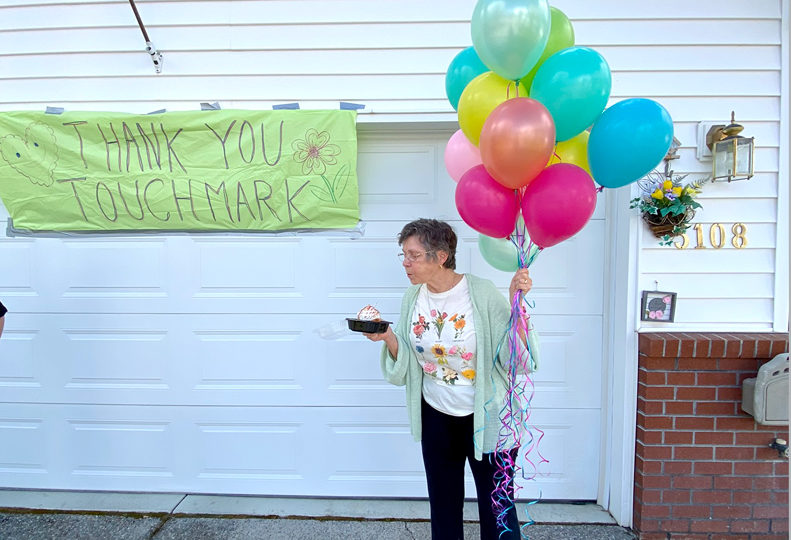
Home » Senior safety in Spokane
Senior safety in Spokane
Retirement homes here encouraging seclusion for their at-risk residents

April 9, 2020
Keith Fauerso, executive director of the Cheney Care Community senior living home, says quarantine measures implemented due the coronavirus pandemic only have furthered the isolation experienced among those who are the most susceptible to the virus.
A 32-year employee in the senior care industry, Fauerso says he’s not seen anything like the effects the coronavirus is having on the nursing care industry and elderly communities in general.
“It’s got to be hard; I’m sure it is for the residents,” he says of enforced isolation measures that have been taken. “There’s got to be a factor of depression that comes along with it.”
Despite social-distancing protocols, a resident at the facility became the first there to test positive for COVID-19 on April 1, after being transported to a local hospital on March 29 for showing symptoms of the virus.
“Our medical doctor has ordered everyone to their rooms,” he says. “There are no visitors allowed unless it’s an end-of-life event.”
No other residents and none of Cheney Care’s staff were showing symptoms as of April 3, Fauerso reported.
Across the country, nursing home and other senior care facilities say they’ve have had to respond in unprecedented fashion in order to protect their residents from the virus. In its 2015-16 report, the Centers for Disease Control and Prevention, said there are 15,600 nursing homes in the U.S. with a total of 1.3 million residents.
In Spokane, Brookdale Living Communities Inc., which is based in Brentwood, Tennessee, operates a total of five nursing home facilities here. Nationwide, Brookdale says it serves more than 1,000 senior residential complexes in 47 states across the country with a total of 103,000 residents.
Heather Hunter, Brookdale’s Tennessee-based spokeswoman, says the company is referring all media inquiries to its website about measures it is taking during the pandemic.
In order to help protect residents,, associates and visitors, Brookdale states company representatives are in constant contact with leading medical centers for recommendations and guidance to complement the “internal expertise” of its clinical team.
Additionally, Brookdale has suspended all previously planned and sponsored group outings that don’t involve health care-related appointments. The company has restricted visitors and nonessential health personnel, except in end-of-life situations, “or pursuant to the guidance of public health officials.” Anyone pre-approved for entrance to a nursing home must undergo a health screening.
Brookdale’s website says in “most cases” that residents can leave their individual rooms.
“We are educating our residents on social distancing and health practices set forth by the Centers for Disease Control and Prevention and local and government officials,” Brookdale says.
Beaverton, Oregon-based Touchmark LLC, which operates Touchmark South Hill at 2929 S. Waterford, has also referred media inquiries to its website. As of March 14, the company says it began following guidelines from the Centers for Medicare and Medicaid Services, as well as other national and state agencies, to protect those who are 60 years and older.
Touchmark operates 14 retirement communities in 10 U.S. states and one Canadian province. More than 2,800 people live in Touchmark communities.
As is the case with Cheney Care Community and Brookdale, Touchmark has postponed happy hours and group activities regardless of size, closed fitness studios, discontinued all personal training, and closed game rooms, its website says.
All dining venues are closed, and dining services staff is providing home deliveries for breakfast, lunch, and dinner says the website.
To mitigate reduced interaction, Fauerso says small groups of Cheney Care’s staff will make a couple of rounds each day to hold a brief social activity at a distance for residents.
“From their doorways, they can sing a song into the hallways,” Fauerso says.
The occasion is a welcome relief for many as it helps break the silence of the imposed quarantine.
“It also gives residents a time to say hello to each other and have some interaction with their neighbors,” he says.
Cheney Care, like other elder care facilities, has worked with residents and their families to set up video conferencing through FaceTime, Skype, Zoom, and other video chat applications, Fauerso says.
For those senior citizens who continue to maintain their own residences across Eastern Washington, Lynn Kimball, the executive director of Aging & Long Term Care of Eastern Washington, says the organization is continuing to operate with its partnered caregivers.
The organization is one of 13 area agencies that contracts with the Washington state Department of Health and Human Services to provide in-home care to seniors. The agency serves an average of 14,000 area seniors in Spokane, Stevens, Ferry, Pend Oreille, and Whitman counties, Kimball says.
Beginning the last week of March, Aging & Long Term Care and its partners were notified they’d be getting more volunteer assistance from students at the Washington State University College of Nursing to help deliver goods to seniors.
“Being able to do essential shopping for seniors is just critical right now,” Kimball says.
Aging & Long Term Care and its partners also work with Frontier Behavioral Health Services to offer a hotline for seniors to access in the event they feel the need to talk with someone.
“It’s such a critical time for senior citizens right now, and there are a lot of ways the community can step up to help,” she says.
Latest News Up Close Real Estate & Construction Health Care
Related Articles
Related Products




